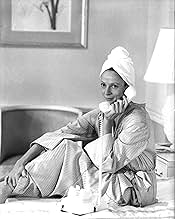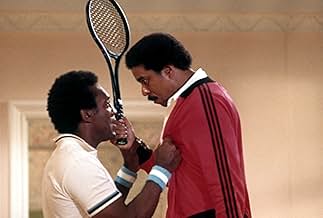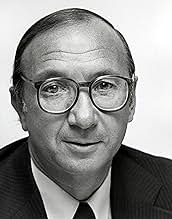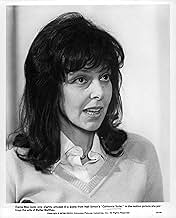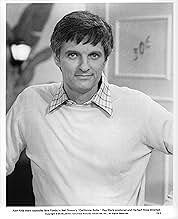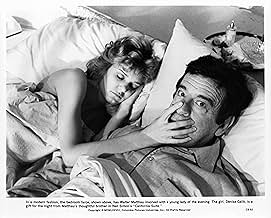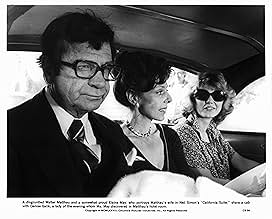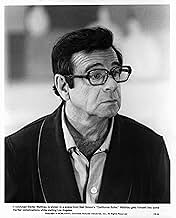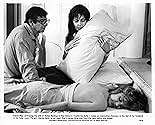CALIFICACIÓN DE IMDb
6.2/10
8.8 k
TU CALIFICACIÓN
The misadventures of four groups of guests at the Beverly Hills Hotel.The misadventures of four groups of guests at the Beverly Hills Hotel.The misadventures of four groups of guests at the Beverly Hills Hotel.
- Dirección
- Guionista
- Elenco
- Ganó 1 premio Óscar
- 5 premios ganados y 10 nominaciones en total
Herb Edelman
- Harry Michaels
- (as Herbert Edelman)
Jerrold Ziman
- Man on Phone
- (as Jerry Ziman)
- Dirección
- Guionista
- Todo el elenco y el equipo
- Producción, taquilla y más en IMDbPro
Opiniones destacadas
This movie is mildly enjoyable, thanks to the amazing cast alone. With a cast like this, it should have been a lot better than it was. Anyway, Michael Caine & Maggie Smith play a rather disjointed couple coming from New York to attend The Oscars. Jane Fonda & Alan Alda are no longer together, argue constantly about custody of their daughter. Bill Cosby & Richard Pryor's wives come to play tennis and chill, but chaos ensues when they find out there is only one room vacant. Walter Matthau has too much to drink and sleeps with a prostitute. The stories are all interesting enough, but none of them are all that dynamic. Matthau has some great comic sequences, but i'd have to say Cosby & Pryor were the least interesting. It wasn't all that funny. The best is a tie between Caine & Smith's and Fonda & Alda. If it wasn't for a cast, this would have been very mediocre.
6/10
6/10
Maggie Smith's passing this past Friday motivated me to revisit this fondly remembered 1978 comedy directed by Herbert Ross. The film consists of Neil Simon's series of four overlapping mini-plays set at the tony Beverly Hills Hotel, a SoCal version of his previous "Plaza Suite". The standout story starred Smith and Michael Caine as an Oscar-nominated film actress and her bisexual antiques dealer husband in town for the ceremony. Atypical for Simon, the screenplay has the incisive, back-and-forth wit of a British drawing room farce delivered impeccably by the two stars. Smith gets the best lines commenting on her nonexistent hump and her resemblance to a steel-belted radial tire. The other storylines feel dated and pale by comparison - Alan Alda and an especially brittle Jane Fonda as a bickering divorced couple, Walter Matthau hiding an unconscious hooker from his wife Elaine May, and especially the now cancelled Bill Cosby and Richard Pryor as warring doctors whose chief victims are their wives. Do yourself a favor and fast forward to the Smith-Caine scenes to appreciate their ample talents. Their scenes are a 10, the rest around 5.
7sol-
An ensemble cast that dreams are made of is present in this film, and all deliver quite well, even Walter Matthau who goes a bit over-the-top. Smith deservedly won an Oscar for her role as a screen actress loses her first Oscar nomination in a very long career. As her husband, Caine is also good, but the next two best performances come from Fonda and Alda as a bickering divorced couple. Those four performers, however, only cover two out of four tales in this film, and the other two are not as well as acted and neither are they filled with the same quality of witty dialogue. It is bit weird to watch the overall film, as it becomes fragmented by the transitions between each of the stories, and towards the end the lesser interesting tales dominate. With just the Fonda/Alda and Smith/Caine stories, this is excellent, very well written stuff. With all four put together, it is still quite interesting stuff, but nothing too great.
That's the one thing I remembered about this Neil Simon comedy, Maggie Smith saying "That's not funny, that's bizarre" I had never heard the word "bizarre" like that. Bee-zaaaarr, or something like that but Maggie Smith uses it brilliantly as an irresistible comic tool. I remember being kind of put off because Maggie won an Oscar for this over Meryl Streep for The Deer Hunter but, watching it now. I understand. Maggie Smith is fantastic and her marital banter with Michael Caine is a total delight. The movie, as a movie is a whole other story. Flimsy and dated with a musical score that may remind you of some of most generic TV movie. Jane Fonda is great, Elaine May and Walter Matthau, hilarious but it also has Bill Cosby, hard to watch now and a hilarious Richard Pryor. Herbert Ross directs respectfully but without any cinematic ambitions. Maggie Smith and Michael Caine however make the whole thing worth it.
Neil Simon's 1978 film, California Suite, is four vignettes of couples descending upon Los Angeles at Oscar time: one couple (Maggie Smith and Michael Caine) for the Oscar ceremonies, two couples for vacation (Richard Pryor, Gloria Gifford, Bill Cosby, Sheila Frazer) one couple for a bar mitzvah (Walter Matthau and Elaine May), and one divorced couple (Alan Alda and Jane Fonda) to discuss their daughter.
The film is a mix of comedy, slapstick, and drama, with the Fonda-Alda segment witty but serious, the Matthau-May segment hilarious, the Cosby-Pryor segment slapstick, and the Smith-Caine segment a classic. Their conversation in the hotel suite before the Oscar ceremony is one of the best acted, best written scenes ever written. "I'm a dark horse," Smith says of her Oscar nomination, entering the room in a gown. "They must have seen the dress," Caine concludes.
This is probably the most fully fleshed-out story, with the truth behind their marriage emerging as Smith descends into drunkenness later on. That and the Matthau-May vignettes are the best, with the Alda-Fonda scene coming off as somewhat dated today. The weakest is the Pryor-Crosby.
Entertaining - if you don't feel like watching the whole thing, just watch the Caine-Smith and Matthau-May.
Bill Cosby and Richard Pryor try their best as doctor friends who are having an awful time on their vacation with their wives. It's just not that funny, despite them both being extremely likable.
Alan Alda and Jane Fonda do well in their dramatic story of separated couple meeting after nine years to discuss their child. Their segment is too short to really have an impact, might have worked well as a feature film. It's not all that involving.
Michael Caine and Maggie Smith are both excellent in their little segment, with Smith portraying an actress who's up for the academy award. Caine plays her show off gay husband. The two stars really shine in an otherwise average story, not all that interesting.
The film is a mix of comedy, slapstick, and drama, with the Fonda-Alda segment witty but serious, the Matthau-May segment hilarious, the Cosby-Pryor segment slapstick, and the Smith-Caine segment a classic. Their conversation in the hotel suite before the Oscar ceremony is one of the best acted, best written scenes ever written. "I'm a dark horse," Smith says of her Oscar nomination, entering the room in a gown. "They must have seen the dress," Caine concludes.
This is probably the most fully fleshed-out story, with the truth behind their marriage emerging as Smith descends into drunkenness later on. That and the Matthau-May vignettes are the best, with the Alda-Fonda scene coming off as somewhat dated today. The weakest is the Pryor-Crosby.
Entertaining - if you don't feel like watching the whole thing, just watch the Caine-Smith and Matthau-May.
Bill Cosby and Richard Pryor try their best as doctor friends who are having an awful time on their vacation with their wives. It's just not that funny, despite them both being extremely likable.
Alan Alda and Jane Fonda do well in their dramatic story of separated couple meeting after nine years to discuss their child. Their segment is too short to really have an impact, might have worked well as a feature film. It's not all that involving.
Michael Caine and Maggie Smith are both excellent in their little segment, with Smith portraying an actress who's up for the academy award. Caine plays her show off gay husband. The two stars really shine in an otherwise average story, not all that interesting.
¿Sabías que…?
- TriviaDiana Barrie (Dame Maggie Smith) says that she wishes David Niven could accept her award for her because he would be witty and charming. In the play on which the movie is based, the character says "Michael Caine," but it was changed when Caine was cast as her husband.
- ErroresThe movie begins with Maggie Smith's character's movie-within-movie, which shows her in a small airplane apparently about to crash. It is being shown as the in-flight entertainment as she flies on a commercial flight into Los Angeles. In reality, commercial airlines never show movies with airplane crashes in them.
- Citas
Hannah Warren: You're worse than a hopeless romantic. You're a hopeful one.
- Créditos curiososIn the opening credits, famous 70s artworks of British artist David Hockney are featured. The painting before Elaine May's name is entitled "Portrait of an Artist (Pool with two figures), 1972" and features a swimming pool with the Hollywood hills in the backdrop. The "two figures", both male, one swimming and the other standing over watching have been mysteriously edited out of the picture for some unknown reason.
Selecciones populares
Inicia sesión para calificar y agrega a la lista de videos para obtener recomendaciones personalizadas
- How long is California Suite?Con tecnología de Alexa
Detalles
- Fecha de lanzamiento
- País de origen
- Sitio oficial
- Idioma
- También se conoce como
- Neil Simon's California Suite
- Locaciones de filmación
- 21932 Pacific Coast Highway, Malibú, California, Estados Unidos(24932 Pacific Coast Highway, Malibu, California)
- Productoras
- Ver más créditos de la compañía en IMDbPro
Taquilla
- Total en EE. UU. y Canadá
- USD 29,000,000
Contribuir a esta página
Sugiere una edición o agrega el contenido que falta

